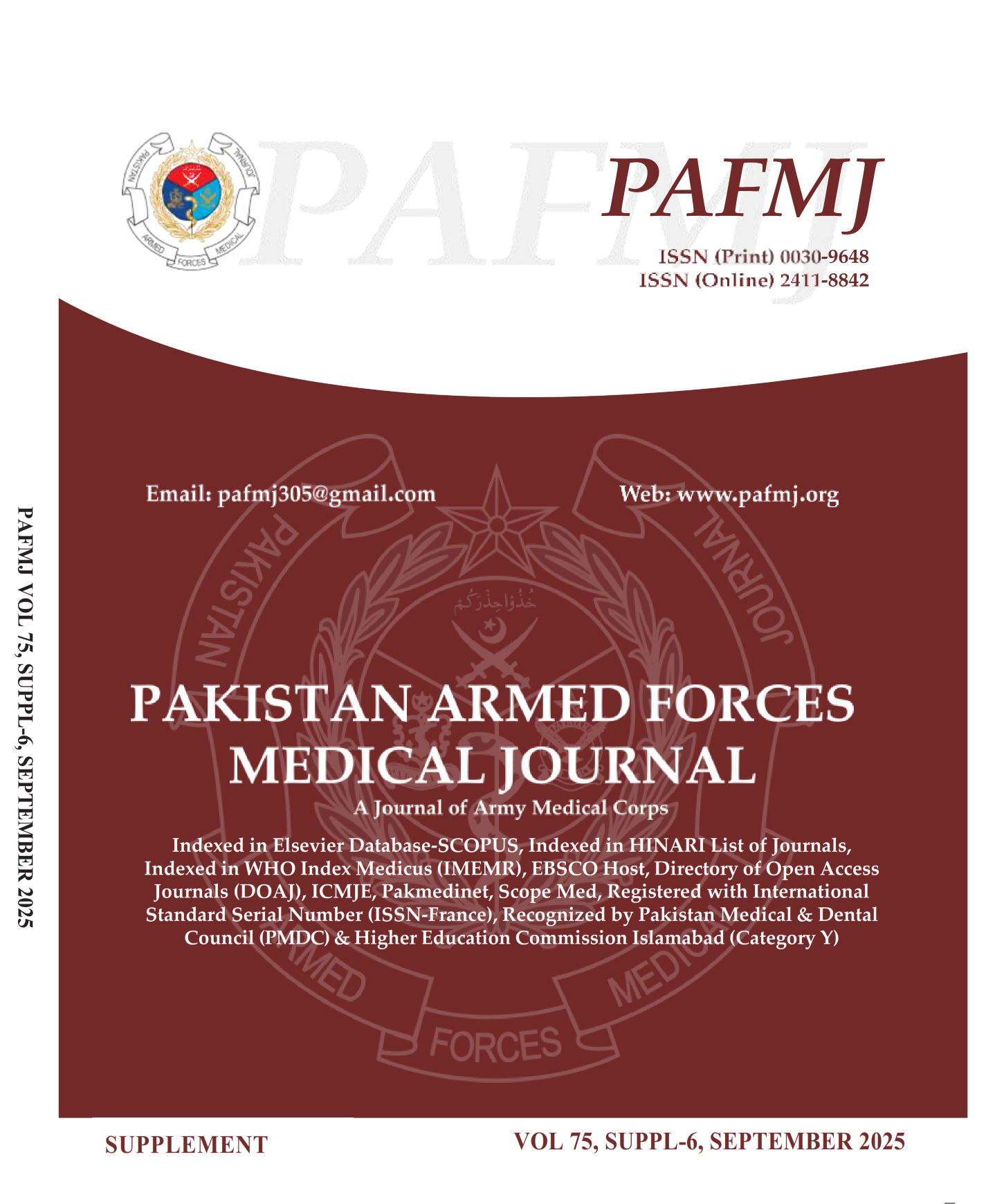Effect of BMI On Subarachnoid Depth And Spinal Anesthesia Techniquein Elective Cesarean Section
DOI:
https://doi.org/10.51253/pafmj.v75iSUPPL-6.9245Keywords:
Nausea, Vomiting, HypotensionAbstract
Objective: To determine the effect of Body Mass Index on depth of Subarachnoid Block and technique of Spinal Anesthesia in Elective Cesarean Section.
Study Design: Prospective longitudinal study
Place and Duration of Study: Combined Military Hospital Rawalpindi Pakistan, From Mar - Sep 2022.
Methodology: A total of 60 participants were randomly distributed in two uniform groups with BMI cut off value of 45 between the two. Age of the patients included in the study was from 18-40 years with single pregnancy planned for elective cesarean section. Under standardized technique, spinal anesthesia was given to patients and various characteristics of block, hemodynamic variables and side effects were recorded.
Results: Total 60 patients were recruited in the research with 30 patients in each group. Mean age of patients in group A was 33.83±4.75 years while in group B was 35.57±2.46 years. Episodes of nausea and vomiting were greater in group B as compared to group A. Hypotension episodes and time to achieve blockade at the level of T6 dermatome between two groups were significant with a p-value of <0.05.
Conclusion: The level of anesthesia achieved in patients with BMI >45 is higher, the onset is rapid with more episodes of hypotension and requirement of vasopressors as compared to patients with BMI <45.
Downloads
References
Elmeliegy M. Effect of Body Mass Index on Anesthesia Characteristics and Vasopressor Requirements during Spinal Anesthesia for Elective Cesarean Section. Open Journal of Anesthesiology. 2020; 10(4): 157-169.
2. Šklebar I, Bujas T, Habek D. Spinal anaesthesia-induced hypotension in obstetrics: prevention and therapy. Acta Clinica Croatica 2019; 58(Suppl 1):90.
3. Klimek M, Rossaint R, Van De Velde M, Heesen M. Combined spinal‐epidural vs. spinal anaesthesia for caesarean section: meta‐analysis and trial‐sequential analysis. Anaesthesia 2018; 73(7): 875-888.
4. Watson SE, Richardson AL, Lucas DN. Neuraxial and General Anaesthesia for Caesarean Section. Best Practice & Research Clinical Anaesthesiology 2022 Apr 30.
5. Ferrarezi WP, Braga AD, Ferreira VB, Mendes SQ, Brandão MJ, Braga FS, Carvalho VH. Spinal anesthesia for elective cesarean section. Bupivacaine associated with different doses of fentanyl: randomized clinical trial. Brazilian Journal of Anesthesiology 2021; 71: 642-648.
6. Sun S, Wang J, Bao N, Chen Y, Wang J. Comparison of dexmedetomidine and fentanyl as local anesthetic adjuvants in spinal anesthesia: a systematic review and meta-analysis of randomized controlled trials. Drug design, development and therapy 2017; 11: 3413.
7. Alur J, Korikantimath VV, Jyoti B, Sushma KS, Mallayyagol NV. A comparative study of analgesic efficacy of intrathecal bupivacaine with ketamine versus bupivacaine with magnesium sulphate in parturients undergoing elective caesarian sections. Anesthesia, Essays and Researches 2021; 15(4): 379.
8. Crespo S, Dangelser G, Haller G. Intrathecal clonidine as an adjuvant for neuraxial anaesthesia during caesarean delivery: a systematic review and meta-analysis of randomised trials. International journal of obstetric anesthesia. 2017 Nov 1;32:64-76.
9. Siagian A, Shafira KD, Amadita P. The Prevalence of Complications After Spinal Anesthesia in Post-Surgical Patients. Headache. 2021; 34: 36-56.
10. Massoth C, Töpel L, Wenk M. Hypotension after spinal anesthesia for cesarean section: how to approach the iatrogenic sympathectomy. Current Opinion in Anesthesiology 2020; 33(3): 291-298.
11. Chooi C, Cox JJ, Lumb RS, Middleton P, Chemali M, Emmett RS, Simmons SW, Cyna AM. Techniques for preventing hypotension during spinal anaesthesia for caesarean section. Cochrane Database of Systematic Reviews 2017(8).
12. Kinsella SM, Carvalho B, Dyer RA, Fernando R, McDonnell N, Mercier FJ et al. International consensus statement on the management of hypotension with vasopressors during caesarean section under spinal anaesthesia. Obstetric Anesthesia Digest 2018; 38(4): 171-172.
13. Zhang N, He L, Ni JX. Level of sensory block after spinal anesthesia as a predictor of hypotension in parturient. Medicine2017; 96(25).
14. Huang YY, Chang KY. Sensory block level prediction of spinal anaesthesia with 0.5% hyperbaric bupivacaine: a retrospective study. Scientific Reports 2021; 11(1): 1-6.
15. Kim H, Shin SH, Ko MJ, Park YH, Lee KH, Kim KH, Kim TK. Correlation Between Anthropometric Measurements and Sensory Block Level of Spinal Anesthesia for Cesarean Section. Anesthesiology and Pain Medicine 2021; 11(5).
16. Kim HJ, Kim WH, Lim HW, Kim JA, Kim DK, Shin BS et al. Obesity is independently associated with spinal anesthesia outcomes: a prospective observational study. PloS one 2015; 10(4): e0124264.
17. Brodsky JB, Lemmens HJ. Regional anesthesia and obesity. Obesity surgery 2007; 17(9): 1146-1149.
18. Whitty RJ, Maxwell CV, Carvalho JC. Complications of neuraxial anesthesia in an extreme morbidly obese patient for Cesarean section. International Journal of Obstetric Anesthesia. 2007; 16(2): 139-144.
Downloads
Published
Issue
Section
License
Copyright (c) 2025 Muhammad Saad Sikander, Qasim Rizvi, Osama Abdul Mateen, Hassam Bhalli, Abrar Ahmed, Muhammad Saad Farooq

This work is licensed under a Creative Commons Attribution-NonCommercial 4.0 International License.















